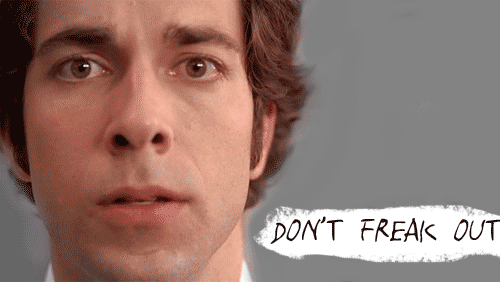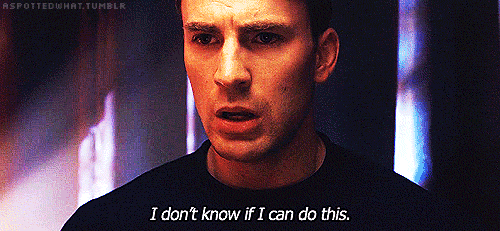I ended getting a call the Tuesday before Labor Day. By Thursday I was in the office of a principal in rural FL, being interviewed for the position of Reading First reading coach, a position that technically needed, according to the grant they ended up hiring me with, an actual Master's in Reading, which, at the time, I happened not to have (I did know a lot about reading, however; it was the credential that I was supposed to need). I was appointed as the TAP mentor for special areas and special education, which I also had no business doing.
The principal told me they needed a reading coach to attend their district meeting in 2 hours, and could I attend?
And I was like:
 |
| Loki smiling over his shoulder, saying, "Yes, of course." |
And then I called my mom and I was like:
 |
| Miley Cyrus sitting during a late night show interview, saying, "Oh my God!" |
And then it set in what this really all meant:
 |
| Person staring woryingly in front of them. Text says, "Don't freak out." |
And I spent the next few hours weeks months like:
 |
| Captain America saying "I don't know if I can do this." |
Eventually they hired a second reading coach so every grade could be reached (Reading First only covered K-3) which took a LOT of the pressure off because we were embarking on the journey together. Still, she was an established professional, and I was the newbie, trying to figure out everything while attempting to be professional, while also not actually owning my own bed and sleeping on a futon and living off my brother's leftover pasta dishes.
Even though I had one year's experience before, this job was different because I was acting as an administrator, and actually needed adults to listen to me. Based on the above experience (and the next one; because, unlike I told myself beforehand, turning 25 did not make people automatically take me seriously) here's a few things I learned about:
SURVIVING YOUR 1ST (-ISH) PROFESSIONAL JOB
1. Don't promise anything; just deliver: As Ginger astutely points out on "Letters to a Young Librarian", when you're just starting a job, your colleagues are just happy you're there as one more body (see above, where I represented a school I hadn't worked in yet at a district wide meeting). When I started at the above job, I wanted to do a before-school literacy period with different grade levels each day. The mistake I made was telling my principal about my plan. Turns out the school day didn't work that way at all, and it wasn't in my power to change anything till the following year. Contrast this with the way my co-reading-coach and I completely changed the way the school did professional development, where the principal witnessed its fruition rather than just heard the plan. If you make promises with wild ideas, you're coming in with a negative sum since your expectations are already higher than your delivery. It's not sandbagging to place realistic expectations on yourself and what you can deliver.
2. Concede to others everything except that which you're most passionate about: Chances are you're already coming in with a lot of assumptions made about you, so don't make it worse by also being the loud mouth know-it-all (even when you're right). Rather than thwarting a coworker's idea, offer to work with them to make their idea a reality. Working together will not only help you get your input without inadvertently insulting your coworker, you'll also form a working rapport that could start new ideas. AND, working as a team can create a better product. You'll also have a greater chance of being heard when the time comes when you pick your battles wisely.
3. Any decision > No decision: There will be times when you will be called upon to make a command decision on your feet: "should I use this color or this one for my display? Which wording sounds better on this flier?", etc. While there are times for introspection and "let me get back to you on that," many of the decisions you make over the course of the day as a professional are spur of the moment, have no protocol, and I promise you, are not life-or-death. If you're called upon to make a decision, you're being regarded as a contributing team member. Don't let this moment pass you by; just make any decision. When in doubt, make the one that will mean less work for everyone.
4. Deadlines= finish the project before adding bells & whistles: If you have a deadline, for God's sake meet it. Meet it before you do anything else. If it's a grant proposal or quarterly report, write the entire thing before fixing any part of it (or, if you're me, creating colorful graphs to accompany it that took way longer than expected). If it's any kind of deliverable, make sure it is completely done in its bare-bones form. Sure, if you run short on time, you are delivering the absolute minimum of what you promised, but at least you're delivering something that can be used if needed in the form you're sending. Perfection isn't for the first draft!
These are not meant to be "tips from a manger to a new hire," because, well, I'm no manager and I've never hired anyone. These are things that worked for me until I could get myself together and perform like a Passable Adult, which, let's face it, all of us need to do sometime.
What sink-or-swim advice do you have from your first job?

No comments:
Post a Comment